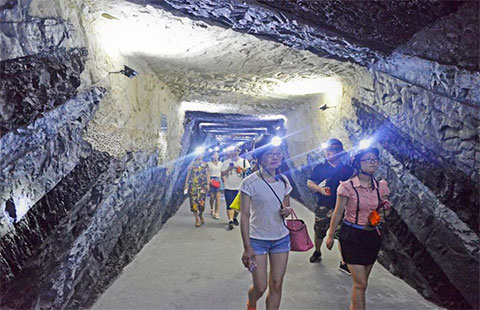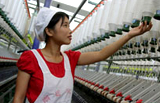FDI rebounds slightly in May
By Bao Chang (China Daily) Updated: 2012-06-16 09:48
China's foreign direct investment inflow stopped its slowdown in May, with an increase of 0.05 percent year-on-year, signaling foreign investors' growing confidence in the world's second-largest economy.
FDI in China rose to $9.23 billion in May, according to data released by the Ministry of Commerce on Friday.
For the first five months of the year, FDI inflow dropped 1.91 percent from a year earlier to $47.11 billion.
"FDI inflow has rebounded from a six-month consecutive fall since November, meaning that foreign investors are regaining their confidence in the Chinese market," said He Weiwen, co-director at the China-US-EU Study Center of the China Association of International Trade.
FDI is a gauge of the health of the external economy. China has been the largest FDI destination among developing economies for years.
China's FDI grew 10 percent to a record high of $116 billion last year, while foreign capital flowing into central and western China increased 14 percent and 28 percent during the same period.
However, due to global economic woes and the ongoing European debt crisis, China's FDI inflow consecutively dropped since November - the longest period of continuous decline since the global financial crisis started.
In April, FDI decreased by 0.7 percent from a year earlier to $8.4 billion.
Chen Jian, vice-minister of commerce, said earlier that the decline of the FDI inflow will not be a long-term tendency.
"FDI was affected by weak external economic conditions and gloomy global economic development," Chen said.
"However, China should take active measures to confront the growth slowdown of the FDI, as the global economy continues to cool down," Chen added.
A report from the United Nations Conference on Trade and Development showed that the global FDI scale this year was expected to be $1.6 trillion, 6.7 percent higher than last year.
The annual increase is 10.3 percentage points lower than the growth last year. According to the report, the slower growth results from the sluggish global economic situation and the capital reimbursements of developed economies, as they try to revive their manufacturing industries.
"China's FDI inflow may begin to see stable growth starting this month, as foreign investors recognize the prosperity of the Chinese economy after the government implemented a series of measures to stimulate the domestic economy," He Weiwen said.
"The slowdown of the US and EU investment in the Chinese market will gradually ease in the second half of this year," He added.
When visiting China in March, Siemens CEO Peter Loscher said that the German industrial giant would continue to increase its investment in China's central and western regions in the coming years.
"We see great opportunities for green business and energy-efficiency projects in those regions which are both tailored to our company's target and China's Five-Year Plan," he said.
China launched new FDI guidelines last year, encouraging foreign companies to invest in the central and western regions, as well as in the high-end manufacturing, high-tech and service sectors.
For the first four months of the year, FDI from the EU slumped by 27.9 percent to $1.9 billion from a year earlier.
baochang@chinadaily.com.cn
- China's non-bank lending for real estate grows
- Agricultural Bank of China expands farming finance service
- Almost ten thousand new cars ruined in Tianjin blasts
- Yuan stabilizes after central bank reassures markets
- 9 major accidents caused by hazardous materials
- China outbound direct investment jumps in seven months
- Startup energy brings Disney's BB-8 droid toy to life
- 9.4 trillion yuan pledged to fight water, air pollution
















